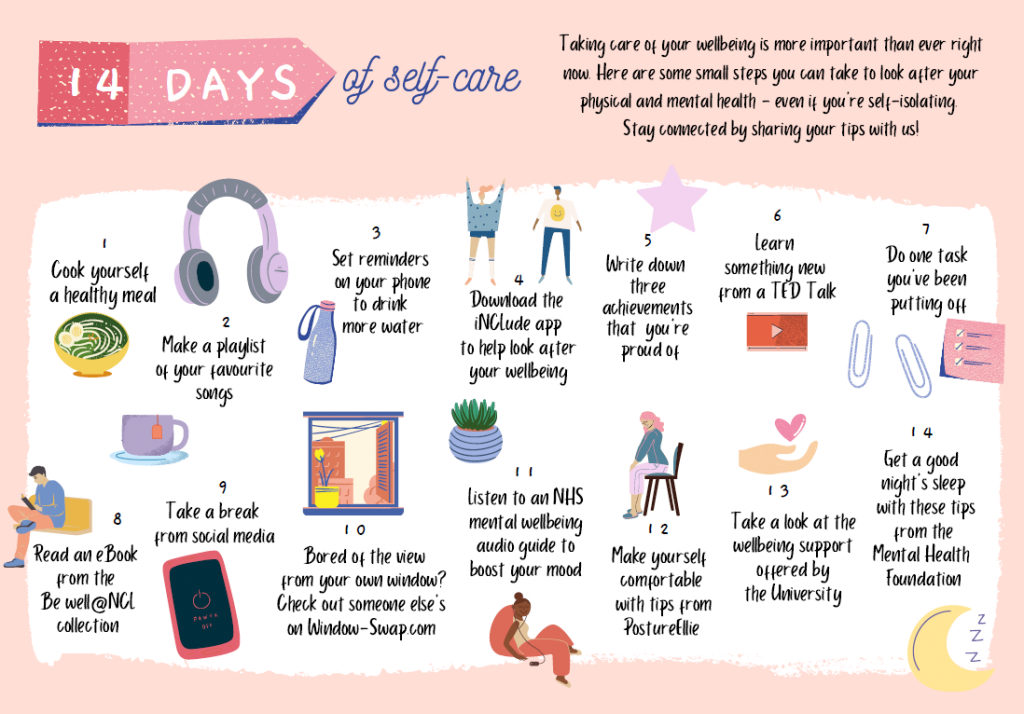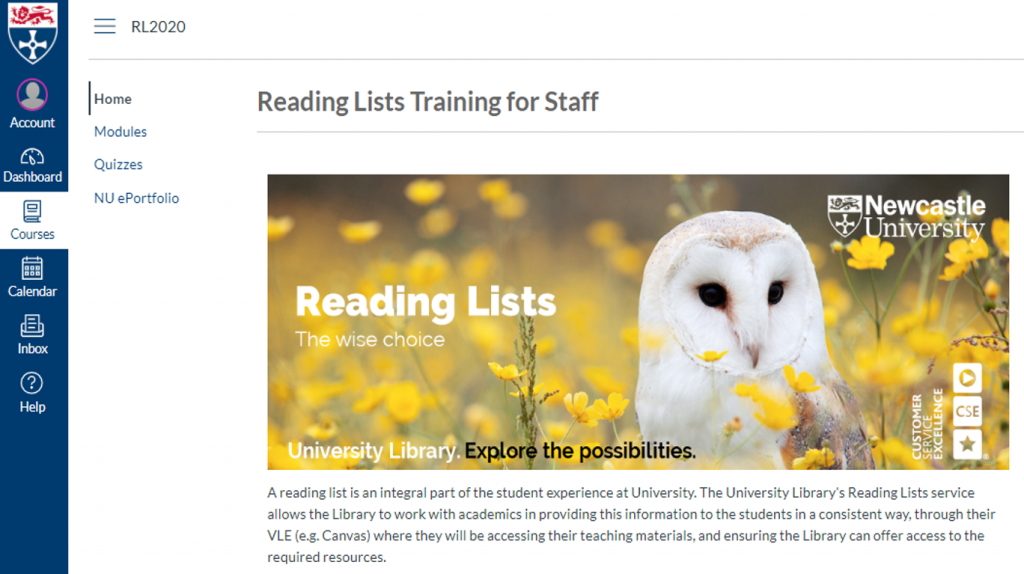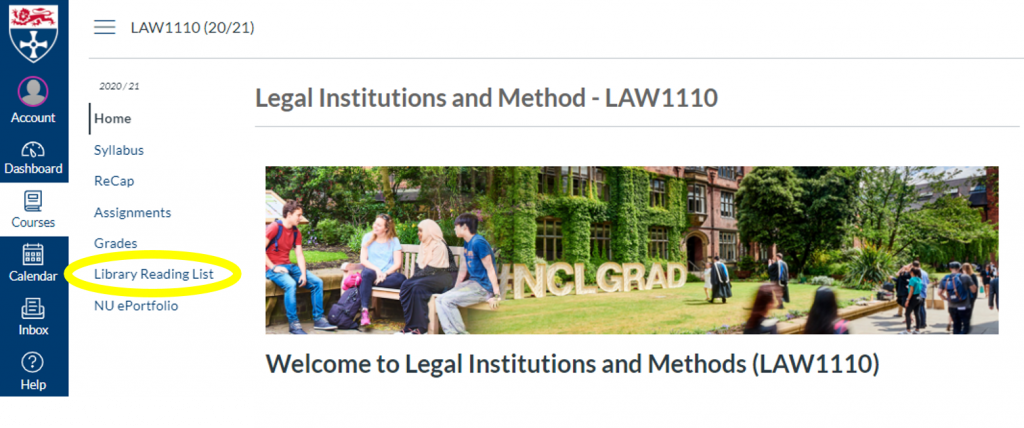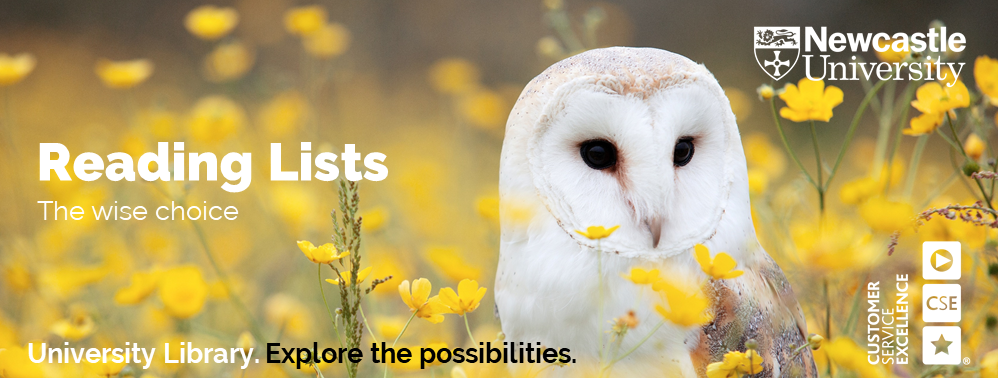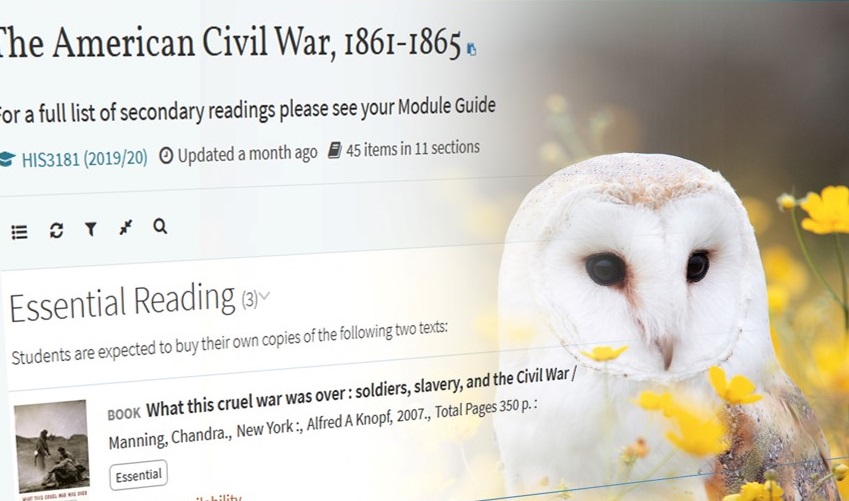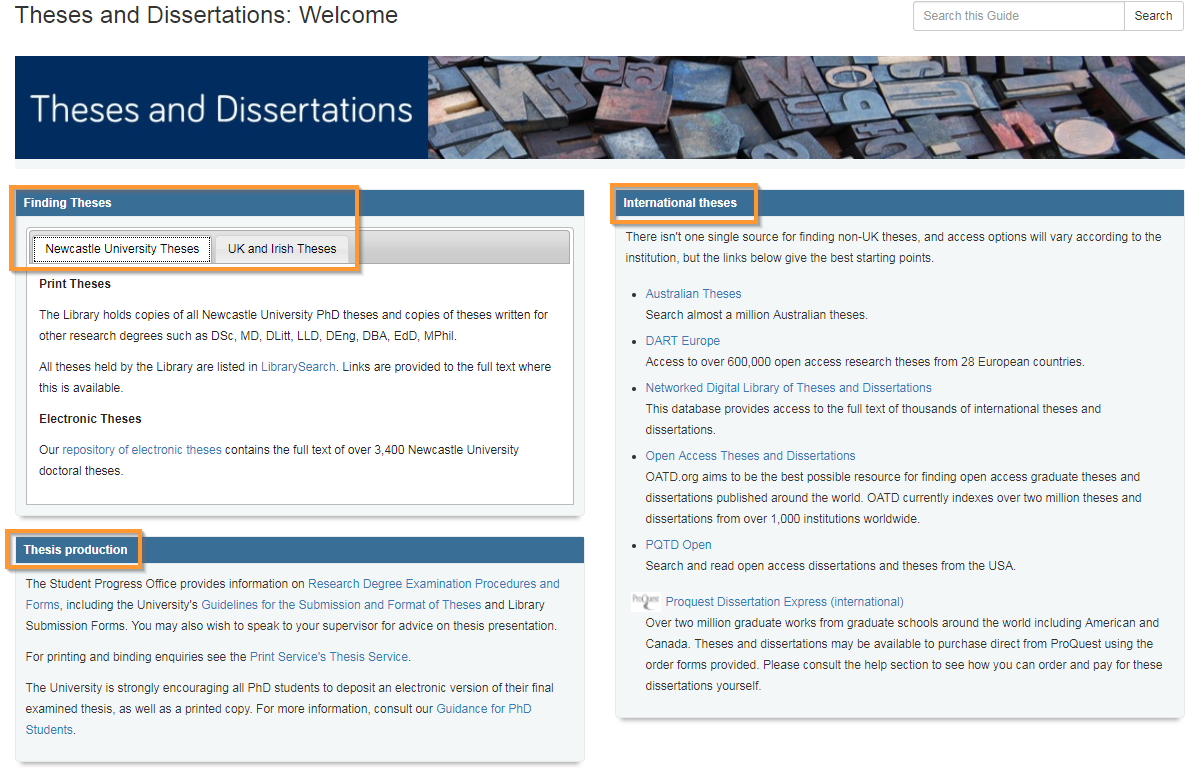
Photo by Max van den Oetelaar on Unsplash
Self Care Week is the 16th-22nd of November this year and we don’t know about you, but we think the timing is just right? In the midst of yet another lockdown and having to study / work mostly online, it gives us a chance to stop, breathe and assess whether we really are doing all we can to look after ourselves. It’s so easy in the midst of pressures and worries to forget about looking after our own wellbeing isn’t it? However, it’s even more vitally important to do it just now. So in light of this, we thought we would highlight some of the services and resources available to you at Newcastle University and some of our own recommendations for establishing positive habits.
Student Health and Wellbeing
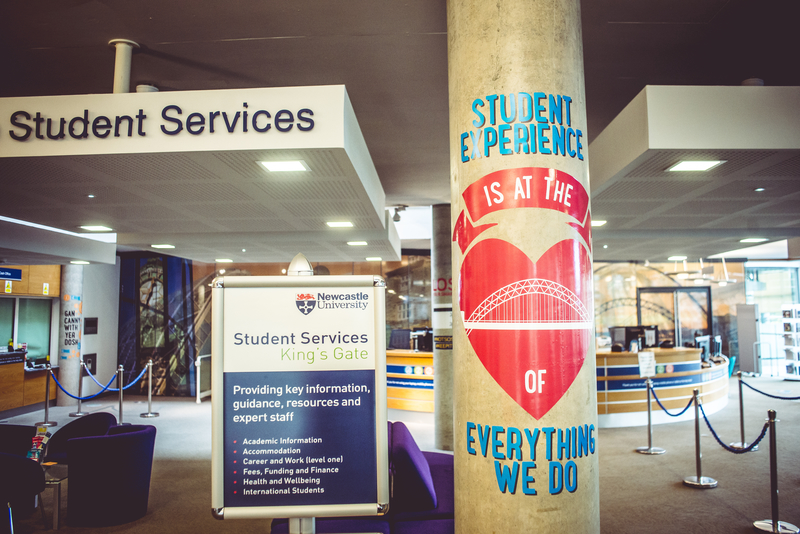
Student Health and Wellbeing work with local and national organisations to help to maximise your academic potential and allow you to have the best possible experience while you’re studying. They offer advice and assistance on many topics, from spiritual support to mental health counselling. You can find self-help resources and information here. They are currently offering online services so do make the most of the support that’s there……..they really are some of the most skilled, approachable and nicest people we have met.
iNCLude
iNCLude is a free app aimed at helping develop positive behaviours to ensure you’re focussing on more than just academic studies. The app centres on several themes: Connect, Be Active, Take Notice, Keep Learning and Give. There’s space to record your feelings in a mood journal and information on campus wellbeing events through your personal feed. It’s available to download on android and apple devices so do check it out.
Silvercloud
Silvercloud is a suite of online Cognitive Behavioural Therapy (CBT) programmes, which can be tailored to your specific needs. It is free and can be accessed anywhere on a PC, tablet or mobile phone. The modules on Silvercloud can be worked through at your own pace and a practitioner from Student Services can help you navigate through the programmes. To find out more and sign up, go to the Silvercloud website.
TalkCampus
TalkCampus is a new mental health service based around peer support, which comes in the form of a free-to-download app. It is perfect if you’re struggling and are worried about your mental health, as it enables you to talk with other students from around the world in a safe and secure way. All you need to gain access to this service is your student email address, but rest assured your identity and location is protected and no-one at Newcastle University will know if you’re using it or not. The app itself is moderated by the TalkCampus team and although it is not a replacement for student wellbeing services, it does help you to connect with other students going through similar issues to your own. It may be a stepping stone for you for getting more help or it might be sufficient in it’s own right. Do check it out if you think it could be of some help.
Be well@NCL
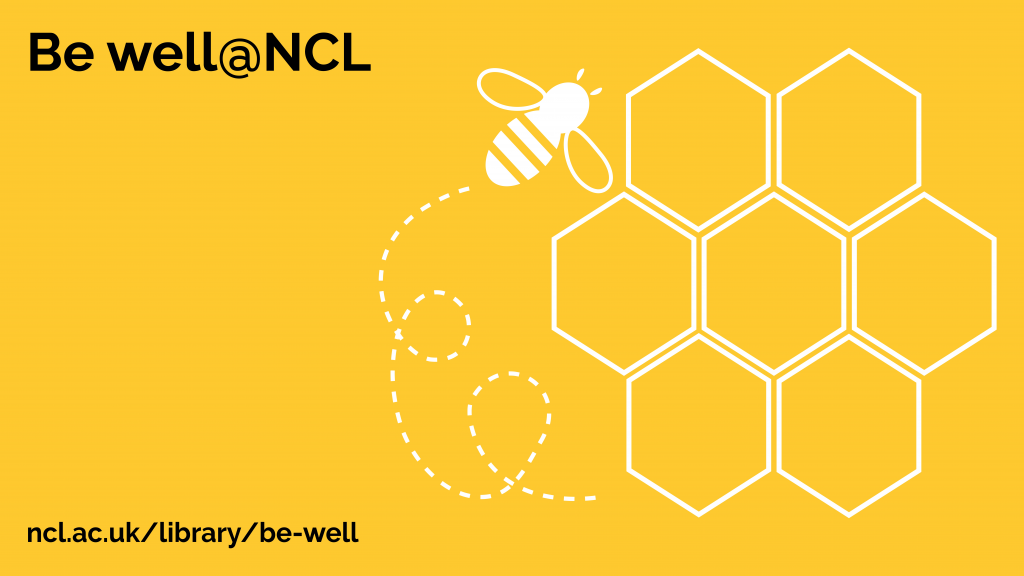
Be well@NCL is a collection of tried and tested books chosen in partnership with Student Wellbeing and other health professionals, so you know you can trust them. The books deal with issues that we all go through at some point in our lives, and even more so at the moment. Topics include stress, anxiety, low self-esteem, sleep problems, eating disorders, depression, OCD, fears, bereavement and so much more. Find out more about our collection on the Be well@NCL website or on the iNCLude app. Some of the collection is accessible in eBook format, while others you can order and pick up through our Click and Collect Service.
Responsible studying
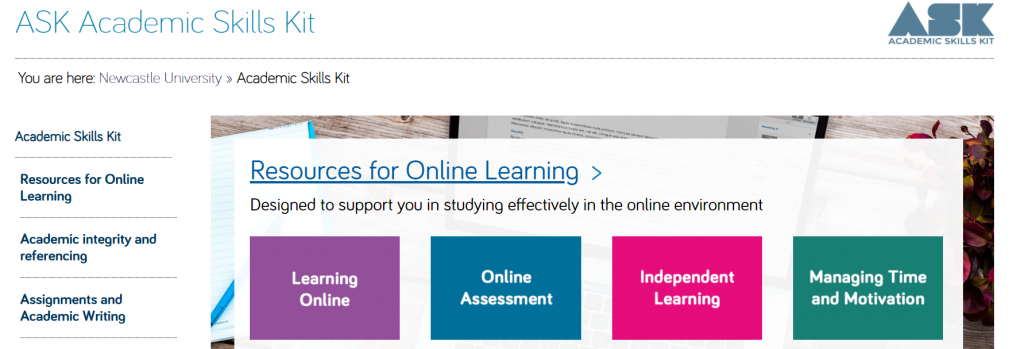
This year has been like no other hasn’t it? We are all having to adapt to this new world of Zoom, teams and online Canvas content and it can feel overwhelming and draining. We’ve tailored specific content within The Academic Skills Kit (ASK) website that helps develop positive study habits for these times, such as studying online, independent learning, motivation, time management, online assessment plus much more. Visit our website to see the range of advice and support available.
Rosie, a Library assistant at the Walton Library, is a fan of the Pomodoro Technique when studying. She says:
“This technique has changed my life! If you are a procrastinator and/or you’re easily distracted, you need to try it – you set a timer on your phone for 25 minutes, work hard on your task for that period and then reward yourself with a 5 minute break. After you’ve done that 4 times, take a longer break.
Breaking work up into chunks with rewards in between means that you get more done than if you try to work non-stop for hours, and it’s easier to start an assignment when you know you only have to work at it for 25 minutes at a time. This technique is better for your stress levels and mental health than beating yourself up for leaving assignments until the last minute.”
Creative activities
Taking a break from your work to do desk yoga, colouring in or origami is beneficial in the long run – it’ll help you increase focus, retain information and maintain top performance.
There’s a variety of activities you can do while taking a break from studying, for example:
- Check out the online programmes put together by some of our schools, such as the visiting speakers’ programme from the Department of Fine Art, the live lunchtime concerts put on by our Department of Music or the literary events put on by the Newcastle Centre of Literary Arts.
- Join a society run through the Students’ Union. These are a great way to meet new people (even if they have to be virtual at the moment). Check out the upcoming events on Students Union webpages and add activities to your diary.
- Simply going for a walk, run, cycle can do you the world of good. Enjoy and breathe that fresh air.
- Ring a friend or a family member and have a good chat. Connecting with others can make such a huge difference.
- Learn a new hobby or pick up something that’s fallen by the wayside such as playing an instrument, drawing, crafting etc.
Stacey, a Library assistant at the Walton Library, likes to knit to improve her mental wellbeing. She says:
“The health benefits of knitting have been known for a while. A 2007 study conducted by Harvard Medical School’s Mind and Body Institute found that knitting lowers heart rate by an average of 11 beats per minute and induces an “enhanced state of calm,” as the repetitive movements release serotonin which can lift moods and dull pain.
Knowing this and gaining the ability to watch your toddler running around wearing clothes you’ve made is a wonderful feeling, as if you are covering your loved ones with wool and love – the only downside is cost (and explaining a million times it isn’t just for old ladies!) Knitting gives me that ‘enhanced state of calm’, or the ability not to be totally radgie ALL of the time, which is essential for my wellbeing.”
14 day self care challenge
It’s easy to read a blog like this and think yeah, yeah, I know what I should be doing but we often find it hard to put it into practice? Why not commit with us then to looking after yourselves better for the next 14 days and take the self care challenge, created by our lovely Library Assistant Rosie. We’d love to hear how you are getting on so do get in touch:
